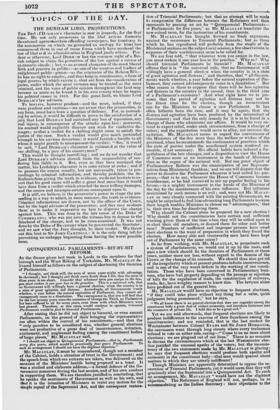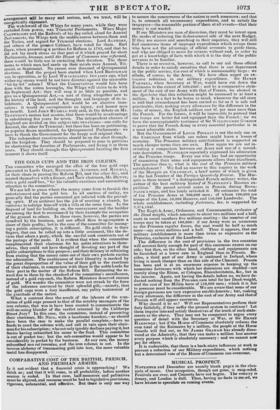QUINQUENNIAL PARLIAMENTS—BIT-BY-BIT REFORM.
AT the dinner given last week in Leeds to the members for that borough and the West Riding of Yorkshire, Mr. MACAULAY de- livered himself as follows on the subject of shortening the duration of Parliaments.
"I thought, and think still, the term of seven years might with advantage Ve shortened; but I thought and think more firmly than I did, that the term of Aires years is too short. Consider that whatever term you assign in the law, swot must reckon it one year less in the practice. This is a universal rule, that no Government will willingly have a general election, when the country is in 1 state of great agitathin and distress. Accordingly, all Governments watch whether, a year before the natural expiration of Parliament, they cannot ad- vantageously come to a dissolution. The consequence is, that you will find that for the last seventy years since the accession of George the Third, no Parliament has been suffered to sit for seven years, even those with which Ministers were lest pleased. Therefore, as this cause would continue to operate, triennial Parliaments would in fact be biennial Parliaments."
After stating that he did not object to biennial, or even annual Parliaments, on the ground of their bringing the' representative too often within the control of his constituents,—and that the "only question to be considered was, whether general elections were not productive of a great deal of inconvenience, irritation, excitement, and unpleasant feeling among, the constituent bodies of large places," Mr. MACAULAy said, "I should not object to Quinquennial Parliaments,—that is, Parliaments every five years, which would be practically four years Parliaments. To such an arrangement I should not have the slightest objection."
Mr. MACAULAY, it must be remembered, though not a member of the Cabinet, holds a situation of trust in the Government; and the speech from which our extracts are taken, was delivered on the occasion of the Ministers' health being proposed as a toast. It was a studied and elaborate address,—a formal defence of the Go- vernment measures during the last session, and of his own conduct in supporting them. We are therefore justified in concluding, that he speaks the sentiments of Government as well as his own, and that it is the intention of Ministers to resist any motion for the simple repeal of the Septennial Act, and the consequent restora- Lion of Triennial Parliaments ; but that an attempt. will be made ti compromise the difference between the Reformers and their opponents by passing an act for " Quinquennial' Parliaments— or Parliaments for five years," as Mr. MACAULAY translates' the
new-coined term, for the instruction of his constituents. •
Mr. MACAULAY has brought forward no fresh arguments against the recurrence to Triennial Parliaments ; but as those which he has reproduced will probably form the staple of the Ministerial orations on the subject next session, a few observations in exposure of their worthlessness seem to be called for.
We are first told, " that whatever term you assign in the law, you must reckon it one year less in the practice." Why so ? Why should triennial Parliaments be biennial ? , Mr. MACAULAY affirms that it is " the universal rule, that no Government will willingly have a general election when the country is in a state of great agitation and distress ;" and therefore, that " all Govern- ments watch whether, a year before the natural expiration of Par- liament, they cannot advantageously come to a dissolution." But what reason is there to suppose that there will be less agitation and distress in the country in the second, than in the third year of a Parliament's existence? And what right have we to pre- sume. that the period of agitation and distress may not be the fittest time for the electors, though an inconvenient one for the Ministers to choose a new Parliament. It has often hitherto been the case, and it may be again, that the distress and agitation have been produced by the misconduct of Government ; and that the only remedy for it is to be found in a change of those who administer our affairs. It would be very na- tural to expect relief, under such circumstances, from a change of rulers; and the expectation would serve to allay, not increase the agitation. Mr. MACAULAY seems to regard the convenience of the Ministers of the day more than the welfare or wishes of the governed, when he recommends the continuance of practices which the state of parties under the unreformed system rendered ex- cusable, if not necessary. His official habits have induced a for- getfulness of the late changes, and a disposition to view the House of Commons more as an instrument in the hands of Ministers than as the organ of the national will. But one great object of Parliamentary Reform was the emancipation of our Represen- tatives from Ministerial thraldom; and no one will dispute that the power to dissolve the Parliament whenever it best suited his pur- poses,—that is to say, whenever the House of Commons became troublesome, or he had contrived to stir up popular feeling in his favour,—is a mighty instrument in the hands of the Minister of the day for the maintenance of his own influence. But influence maintained by such means is an evil ; and, were not Mr. MAcarr- LAY so very closely connected with the existing Government, we might be surprised to find him advocating long Parliaments because their length enables Ministers to choose an" advantageous," that is, their own time for dissolving them.
Why should the Cabinet alone be prepared for a new election ? Why should not the constituencies have certain and sufficient warning given them of the time when they will be called upon to re-elect their old members, or discard them for other anti better men? Numbers of inefficient and improper persons have owed their elections to the want of preparation in which they found the electors. How many able and trustworthy men have been kept out of Parliament by the same cause? So far from wishing, with Mr. MACAULAY, to perpetuate such a system of charlatanerie, we would cut it up by the roots, and pass a law which should fix the duration of Parliaments at three years, neither more nor less, without regard to the demise of the Crown or the change of its counsels. We should thus also get rid of the irregularity which at present produces infinite inconvenience, and is one of the very worst defects in the working of our consti- tution. Those who have been concerned in Parliamentary busi- ness, who have had property depending on the passage or rejection of bills for the regulation of trade, the construction of railways, roads, &c., have weighty reasons to know this. The lawyers alone have profitted out of the general loss. Mr. MACAULAY would have no objection to frequent elections, "if they could take place without any thing but a calm, quiet judgment being pronounced ;" but he says, "We all know there is no general election that does not engender among the constituent body a great deal of violent animosity, and introduce bitterness into the commerce of private life. I hold this to be a great evil."
Yet we are told afterwards, that frequent elections are likely to produce indifference to the exercise of their franchises among the constituencies; and are reminded, that in the last contest for Westminster between Colonel Evaris and Sir Joirrr HOBROUSE, the canvassers went through long streets where every tradesman refused to vote on either side, saying—" Come to us no more about elections ; we are plagued out of our lives." There is no occasion to discuss the circumstances which at the last Westminster elec- tion justified the unusual apathy of' the voters; but the inconsis- tency of the two statements made by Mr. MACAULAY is glaring: he says that frequent elections would produce both apathy and animosity in the constituent body—that men would quarrel about matters to which they are utterly indifferent! Though Ministers are apparently determined to oppose the re- storation of Triennial Parliaments, yet it would seem that they will graciously alter the Septennial into a Quinquennial Act. To such an arrangement, Mr. MACAULAY " would have not the slightest objection." The Reformers of England will not, perhaps, be so accommodating as the Indian Secretary : their objections to the arrangement ifl. be Many and serious, and, we trust, will be energetically eitpeeased. The watchword of the Whigs for many years, while they were excluded from power, was Triennial Parliaments. When Major CsierwittGrae and the Radicals of his day called aloud for Annual Parliaments, the Whigs took the middle course between them and the Tories, and argued for Triennial elections. Lord ALTHORP, and others of the present Cabinet, have voted for them. Earl GREY, when presenting a petition for Reform in 1793, said that he did not lay much stress on that part of it which prayed for short Parliaments, because, until the House of Commons was reformed, there would be little use in curtailing their duration. The three terms to which men had made up their minds were Annual, Tri- ennial, or Septennial. No person ever dreamed of Quinquennial elections. Had the project been started when Lord BROUGHAM was in opposition, or by Lord WHARNCLIFFE two years ago, what withering sneers would he not have directed against the miserable "bit-by-bit" reform ! What the Conservatives would fain have done with the rotten boroughs, the Whigs will strive to do with the Septennial Act : they will crop it as little as possible, and give us a Quinquennial Act,—a sort of thing altogether new to the history of the land, and the thoughts and language of its in- habitants. A Quinquennial Act would be an abortive inno- vation: it would do corruptionists no injury, and honest men no benefit. Lord Resit RUSSELL truly said, in the debate on Mr. TENNYSON'S motion last session, that there would be no advantage in substituting five years for seven. The independent electors of England are divided on this subject into two classes—one calls for Annual, the other for Triennial; but there has been no petitioning, no popular desire manifested, for Quinquennial Parliaments : we have to thank the Government for the happy and original idea.
The independent constituencies should be on the alert through- out the kingdom. They should be prepared to pour in petitions for shortening the duration of Parliaments, and fixing it at three years. They should strangle this Quinquennial bantling the first moment it shows itself.



















 Previous page
Previous page